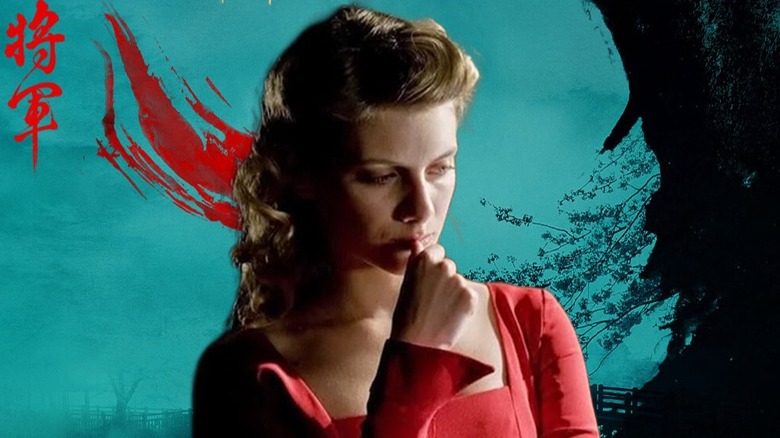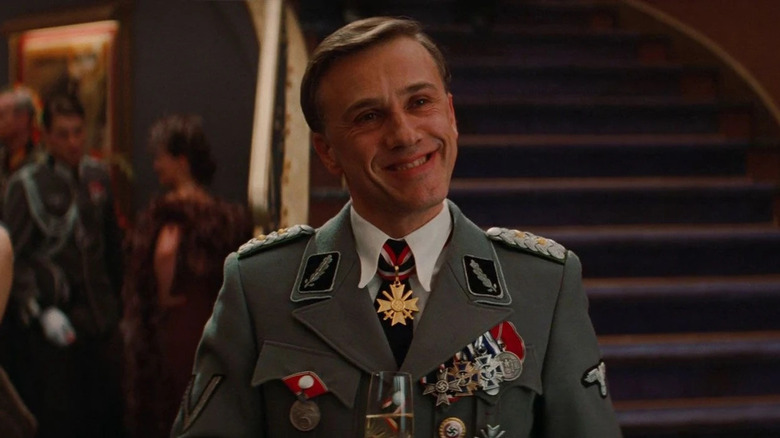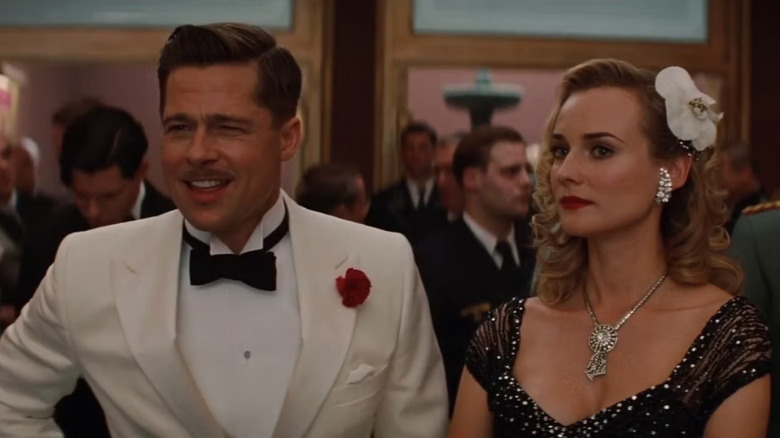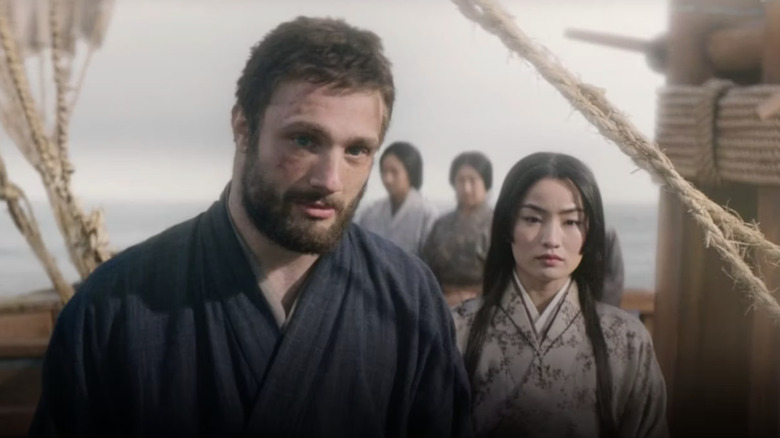Shogun Has An Unexpected Similarity To Director Quentin Tarantino's Inglourious Basterds
American films and television invariably brush up against the issue of language. Since these stories are made for mass appeal — and said mass is English-speaking audiences — the films will depict characters speaking English even if that shouldn't be the case. Take films set during Roman times like "Spartacus" or "Gladiator," which have dialogue spoken only in English, not Latin or even a closer modern stand-in like Italian.
Then there are films with characters from different countries, yet the audience hears them all speaking the same tongue. Some handle this more cleverly than others; in "The Hunt for Red October," the Soviet characters are first heard speaking Russian before a quick switch to English — letting the audience know while they're hearing English, the characters are hearing Russian.
"Shōgun," which recently went from mini-series to a two-season renewal, makes no attempt to hold its audience's hand. Set in 1600 Japan, Lord Yoshii Toranaga (Hiroyuki Sanada) is locked in a deadly political game. He gains an unexpected ally in John Blackthorne (Cosmo Jarvis), an English sailor shipwrecked in Japan. With that setting, it's no surprise that the cast is mostly Japanese, and the show respects that. The Japanese characters speak Japanese, even in private conversations where the show doesn't need to underscore the language differences between them and the Europeans, who speak English (this is the one cheat in the show, with English being the uniform European language and sometimes standing in for Portuguese).
Though "Shōgun" has been likened to "Game of Thrones," the comparison that's been sticking for me is Quentin Tarantino's best movie: 2009 World War 2 epic "Inglourious Basterds." Set in Nazi-occupied France, the film – as "Shōgun" has since done — acknowledges the different languages of the period and works them into its text.
How Tarantino juggled languages in Inglourious Basterds
Tarantino is rightfully heralded as one of the best dialogue scribes we have. This sometimes gets him lumped in with other screenwriters with similar reputations, like Joss Whedon or Aaron Sorkin. What separates Tarantino is not just his much finer skills as a director, but his mastery of character voice. Sorkin and Whedon's dialogue gives away its nature as, well, dialogue, with characters speaking in the way that the writer most fancies. Tarantino's characters don't speak in the same voice, they merely speak the same language. Often it's the same vulgar, pop culture-laden language, but none of them speak it in the same way.
In "Inglourious Basterds," Tarantino carries that respect for characters' individual ways of speaking over to their native tongues. The film alternates between English, French, and German dialogue and then back around again (with a pinch of Italian). Comprehension across language barriers is a continuing vital point for the characters.
The film's first chapter, "Once Upon A Time in Nazi Occupied France," features SS Colonel Hans Landa (Christoph Waltz) interrogating a French farmer, LaPadite (Denis Ménochet), about his sheltering a Jewish family. They initially speak in French, then switch to English at Landa's request. Is it just to make the scene easier for the Americans in the audience to follow? Nope! Landa knows the people he's hunting are hiding under LaPadite's floorboards and don't speak English, so he wants to speak without alerting them of his intentions.
Why Inglourious Basterds needed a linguistic genius
In the fifth and final chapter of "Inglourious Basterds" ("Revenge of the Giant Face"), the Basterds attend a film premiere to assassinate the in-attendance Nazi High Command. Their (poor) disguises as Italians completely fail next to Landa, who speaks more Italian than they do.
The respect to language is baked into the film's casting. As Tarantino told Variety in 2009, "Landa is a linguistic genius, and the actor who played him needed the same facility with language or he would never be what he was on the page." If Tarantino hadn't found Waltz (who speaks English, German, and French, while faking Italian much better than the Basterds do), he would have called off the movie. Similar casting coups are Diane Kruger (a German movie star who successfully immigrated to Hollywood) as Allied double agent Bridget Von Hammersmark and Michael Fassbender (an Irishman with German roots) as Lt. Archie Hicox, an English officer who is bilingual in German.
"Inglourious Basterds" proves in the end it doesn't care about history, but the characters speaking the right language in every scene makes the movie feel more immersive. The same goes for "Shōgun," which is aiming for closer accuracy than the pulp fiction of "Basterds."
Language is the theme of Shōgun
Blackthorne gradually picks up some Japanese across the 10 episodes of "Shōgun," but he mostly relies on translator Lady Mariko (Anna Sawai), a Japanese Christian. During Blackthorne and Toranaga's first conversation in episode 2, "Servants of Two Masters," director Jonathan van Tulleken uses alternating close-ups whenever they speak, creating the illusion they are speaking to each other with mutual understanding.
As the season goes on, it emphasizes more how many conversations have three participants, not two: Blackthorne, one of the Japanese characters, and Mariko. As you watch, you listen not just to what Blackthorne and his counterpart say, but how Mariko relays it. She almost never translates word-for-word, but summarizes (and softens) what the men are saying. She's a woman with keen skills of observation and, far from a dutiful servant, she uses other people's words to serve her agenda.
Blackthorne proves why he needs a translator in episode 5, "Broken to the Fist." Given a home and servants by Toranaga, he orders none of them to disturb a shot pheasant hanging outside the house. He sarcastically declares they'll die if they do because, with his limited Japanese, he can't hammer in the point another way. When one of his servants disobeys the order, he then commits seppuku to restore his soiled honor. Blackthorne is appalled, but his careless words led to that end.
To that point, "Shōgun" underlines the dissonance between the brutality of feudal Japan and the strict decorum. People can be put to death for being impolite to their social superiors, and seppuku is done with the frequency that sacramental Confession is in Europe. In the season 1 finale, "A Dream of a Dream," Toranaga ordering one of his men, "Please commit seppuku by sunset tomorrow," is the perfect summation of this well-mannered violence.
Language is not just about knowing the words, but knowing what people mean when they say them.
"Shōgun" is streaming on Hulu and Disney+.



